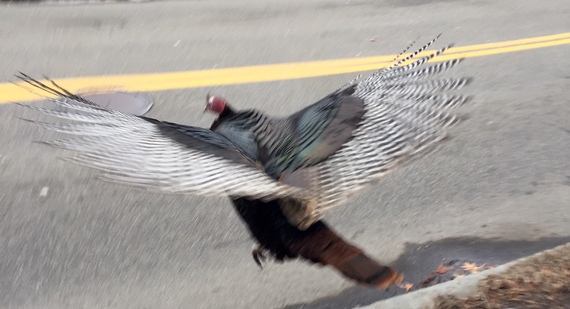"Even creatures you might regard as though they were superfluous were integral to the creation of the world." Midrash Rabbah on Exodus 7
I won't go so far as to call them old friends - tight bunch as they are, the gang of wild turkeys that occasionally wander up into the streets of my Brookline neighborhood don't seem much interested in fellowship beyond their own kind. But at least they don't startle me quite as much as the first time we crossed paths.
That first time, they made the impression of 'Arov - the fourth plague of Egypt, about which we read this week - wild beasts stirred into the mix of human life where one least expects them. I can still remember the acid feeling of shock in my legs, an instinctual if absurd fight-or-flight reaction. I flew - or, at least, I gave the formidable, hip-high fowl the sidewalk.
After all, Rabbi Yehuda ben Bava, in the second century Mishnah, reports of a tarnegol - a rooster of some kind - that was put to death in Jerusalem for killing a child. With their dinosaur-like legs, their hawk-like, banded feathers, their buzzard-like necks, and their general attitude of indifference, these birds lent sudden credence to that tale. 'Gang,' by the way, is the correct collective noun, and apt - by contrast to domesticated butterballs who, as a group, are called a 'rafter.'
These turkeys, when they decide (who knows why) to cross the road, stop rush hour traffic, and they have yet to comprehend a car horn.
I have to doubt that wild turkeys seemed quite so dragon-like to earlier New Englanders of the human species. The Canadian writer and environmentalist Farley Mowatt once predicted that, outside of humankind and its livestock, by the middle of the new century on which we are now embarked, there would be no animal left along the eastern seabord bigger than a breadbox. But the picture was once very different.
At the end of his harrowing and heartbreaking Sea of Slaughter, Mowatt gives this account:
I sit at the window of my home beside the Atlantic Ocean. My work is almost done. Having led me through so many dark and bloody chronicles, this book comes to an end. The question with which it began is answered.
The living world is dying in our time.
I look out over the unquiet waters of the bay, south to the convergence of sea and sky... And in my mind's eye, I see it as it was.
Pod after pod of spouting whales, the great ones together with the lesser kinds, surge through waters everywhere aripple with living tides of fishes. Wheeling multitudes of gannets, kittiwakes, and other such becloud the sky. The stony finger marking the end of the long beach below me is clustered with resting seals. The beach itself flickers with a restless drift of shorebirds. In the bight of the bay, whose bottom is a metropolis of clams, mussels, and lobsters, a concourse of massive heads emerges amongst floating islands of eider ducks. Scimitar tusks gleam like a lambent flame.... The vision fails.
And I behold the world as it is now.
In all that vast expanse of sky and sea and fringing land, one gull soars in lonely flight - one drifting mote of life upon an enormous, almost empty stage.
Eighteenth century mariners, already aware of change, said there had once been days when it seemed one could walk across Boston Harbor on the backs of whales. Red Sox fans of the twentieth century knew a local anthem - "Well I love that dirty water, oh Boston you're my home," as sung by the Standells in 1966.
Does the river have to stink and run with blood, must disease rain from sooty skies, and genetically confused frogs rise from polluted waters with the last salientian articulacy of oddly numbered legs and die where we can see them, must we - God forbid - lose our own firstborn before we acknowledge our fellow living creatures as essential partners in our own existence?
All in all then, I don't mind an occasional interruption of daily life by healthy wild things.

